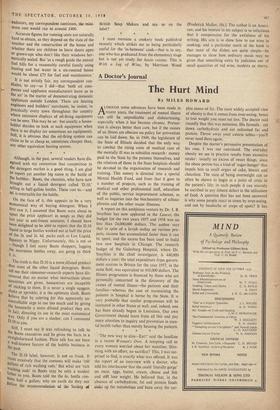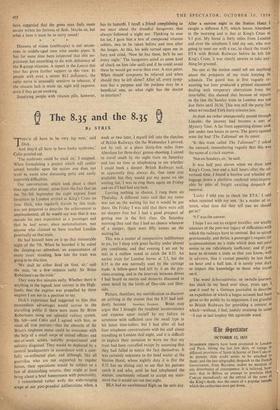A Doctor's Journal
The Hurt Mind
By MILES HOWARD ATHOUGH some advances have been made in L recent years, the treatment of mental illness can still be unprofitable and disheartening, especially when it has become chronic. Preven- tion is always better than cure, but if the causes of an illness are obscure no policy for prevention can be laid down. So, in 1949, the legislature of the State of Illinois decided that the only way to combat the rising costs of medical care of the mentally ill was to subsidise research : money paid to the State by the patients themselves, and the relatives of those in the State hospitals should be devoted to the organisation of research and training. This money is directed into a special Mental Health Fund, and from that it goes to a number of projects, such as the training of medical and other professional staff, education of the public, service improvement schemes, as well as inquiries into the biochemistry of schizo- phrenia and the other major illnesses, A report on this ambitious venture by Dr. J. R. Smythies has now appeared in the Lancet; the budget for the two years 1957 and 1958 was no less than 24,000,000 dollars. The author says that in spite of a lavish outlay on various pro- jects, income has accumulated faster than it can be spent, and the excess' has been used to build two new hospitals in Chicago. The research budget of the Galesburg Hospital, where Dr. Smythies is the chief investigator, is 440,000 dollars a year; the total expenditure from govern- ment sources in Britain for the year 1957, in the same field, was equivalent to 410,000 dollars. The Illinois programme is financed by those who are personally concerned in the discovery of the causes of mental illness—the patients and their families—whereas the cost of maintaining the patients in hospital is borne by the State. It is very probable that similar programmes will be instituted in other States at well, and, indeed, one has been already begun in Louisiana. Our own Government should learn from all this and pay more attention to inquiry and prevention in men- tal health rather than merely housing the patients.
* * *
'The new way to slim—Eat !' said the headline in a recent Woman's Own. A tempting call to every woman worried about her waistline. Slim- ming with no effort, no sacrifice? This, I was sur- prised to find, is exactly what was offered. It was the report of an interview with a doctor, who told his interlocutor that she could 'literally gorge' on meat, eggs, butter, cream, cheese and fish and still lose weight. He believed that, in the absence of carbohydrate, fat and protein foods stoke up the metabolism and burn away the sur- plus stores of fat. The most widely accepted view of obesity is that it comes from over-eating; hence to lose weight you must eat less. The doctor said roundly that this was nonsense. His formula : cut down carbohydrate and eat unlimited fat and protein. Throw away your calorie tables—you'll never need them again.
Despite the doctor's persuasive presentation of his case, I was not convinced. The everyday obesity we see in practice results from excessive intake : usually an excess of sweet things, since the obese person has a kind of 'sugar-hunger' that impels him to small orgies of cake, biscuit and chocolate. The state of being overweight can so often be shown to begin at a point of crisis in the patient's life; in such people it can scarcely be ascribed to any inborn defect in the utilisation of food. A question that has not been answered is why some people react to stress by over-eating, and not by headache or crops of spots? It has been suggested that the gross man feels more secure within his fortress of flesh. Maybe so, but what a bore it must be to carry round!
Dimness of vision (amblyopia) is not uncon- mon in middle-aged men who smoke pipes. It has for some time been suspected that this im- pairment has something to do with deficiency of the B-group vitamins. A report in the Lancet this year has given further support to this view. In people with even a minor B12 deficiency, the optic nerve is unusually sensitive to tobacco; if the vitamin lack is made up, sight will improve. even if they go on smoking.
Supplying people with vitamin pills, however, has its hazards. I recall a friend complaining to me once about the dreadful hangovers that always followed a night out. Thinking to ease his lot, I gave him a box of compound vitamin tablets, two to be taken before and two after the binges. At this, his wife turned upon me in fury and cried, 'Now he has these, he'll be out every night.' The hangovers acted as some kind of check on him (she said) and if he could avoid these he would get worse than ever. A nice point. When should symptoms be relieved and when should they be left alone? After all, every symp- tom has a purpose and the purpose may be a beneficial one, so what right has the doctor to interfere?



































 Previous page
Previous page